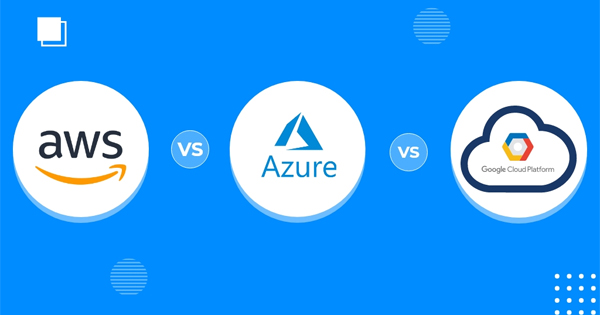Planning to build a robust app? How will you host it?
When you are building an app, you want it to do a plethora of things for you and your business. These things include managing users, synchronizing data across various devices, store and share data, get you real-time stats and much more.
To help your app perform all these tasks seamlessly, you need a perfect hosting service that allows you to build scalable mobile apps and backend infrastructure without having to be caught up in the intricacies of managing servers.
That’s where cloud hosting comes into play.
Azure, AWS, and GCP have their own strengths and weaknesses that make them ideal for different use cases. Let’s take a look at each one of them and how they stand against each other.
Migrating to cloud, is the simplest way to innovate and deploy new competitive services. Besides that, it offers great flexibility with scalability. All three cloud computing vendors are strong contenders for businesses. However, the key is to understand that the various tech strengths and backgrounds have molded the approach of these companies to deliver cloud solutions.
Startup offers
The cloud service providers understand that if they target startups and once they grow big then they will most likely stay with the provider thus bringing them good revenue. This is the reason why each of them offers specific plans for startups.
AWS – Amazon offers two self-starter packs which are free for the first year along with some web-based training. The portfolio packages are included in AWS activate for startup program which is more generous. To qualify for this, a startup must be in the selected incubator/ accelerator or be related to specific venture capital funds.
Azure– In 2018, Microsoft has revamped its offerings for startups. Startups can now get $200 credits for 30 days along with regular free tier service for one year. Besides that, Microsoft promises to provide sales and marketing resources for selling your product.
Google Cloud Platform (GCP)– Google has one of the best offerings for new startups. GCP has three options which give credits of $3000, $20,000, $100,000 for one year under 3 different packages.
So, all three cloud providers offer around $100,000 to the best startups via referrals from incubators and accelerators
Now let’s take a look at the overall pros and cons of these three cloud service providers.
AWS
The biggest strength of Amazon is its dominance in the cloud market and the reason for its popularity is the massive scope of its operations. AWS offers a wide variety of services along with the most comprehensive network of global datacenters.
The pricing is based on the amount of use and scaling is easy and can support an unlimited number of users. Besides that, there is a lot of customization, flexibility, and support for third-party integrations. Furthermore, Big Data solutions and real-time analytics are available along with a set of cloud-based disaster recovery services.
However, the biggest disadvantage of AWS is its cost. Many enterprises find it difficult to understand and manage the cost structure of AWS effectively when running a high volume of workload. So for a startup company the difficulty level increases since they have limited resources.
Overall, the cons of Amazon can be overlooked considering its strengths and companies of all sizes continue to use it for a wide range of workload.
Azure
Microsoft repurposed its on-premise software-Office SQL, Windows Server, Sharepoint, .Net, Dynamics Active Directory for the cloud. One of the biggest reason for its success is that most of the enterprises deploy Windows and other Microsoft software. Since Azure is strongly integrated with these applications, startups that use Microsoft software often will find it convenient.
The setup is easy and there is a variety of price offerings and the biggest strength is its speed. The downside of Azure is the service experience, customer issues with technical support, training, documentation has been often cited.
GCP
Since the time Google developed Kubernetes standard it has a strong offering in containers. Google Cloud Platform specializes in high compute offerings in machine learning and big data analytics. Besides, that GCP offers considerable load balancing and scale.
GCP integrates easily with other services and
highly-discounted prices are offered for long-term contracts.
Moreover, when compared to AWS and Azure, GCP is the cheapest
provider in terms of computing power both in reserved and
on-demand instances. Both AWS and Google continue to tweak
their systems to ensure applications are easy to configure and
launch. However, GCP has an edge since
their systems can be deployed on all types of systems without
worrying about the compatibility issues.
The downside is that GCP is often chosen as the secondary provider, however, it is now being progressively chosen as a strategic alternative to Amazon.
Conclusion
It’s is a serious business choice to choose between these three cloud service providers. Nobody can say which provider wins the battle. AWS always had a huge market share, though Azure and GCP continue to close the gap.
More and more businesses are adopting the cloud at one point or another. And because of the same, the industry is booming. Now, the question is which cloud platform you should use to host your web or mobile app?
While the cloud computing market is flooded with numerous cloud service providers – Amazon AWS, Microsoft Azure and Google cloud platform are the leaders of the domain. If you are confused between the three of them and couldn’t find out which one you should use, this blog is for you.
Here, we will discuss AWS vs Azure vs Google Cloud Platform to conclude which is best among the three. So, let’s get started with your cloud migration, please email us on salesteam@silsaiconnects.com.

